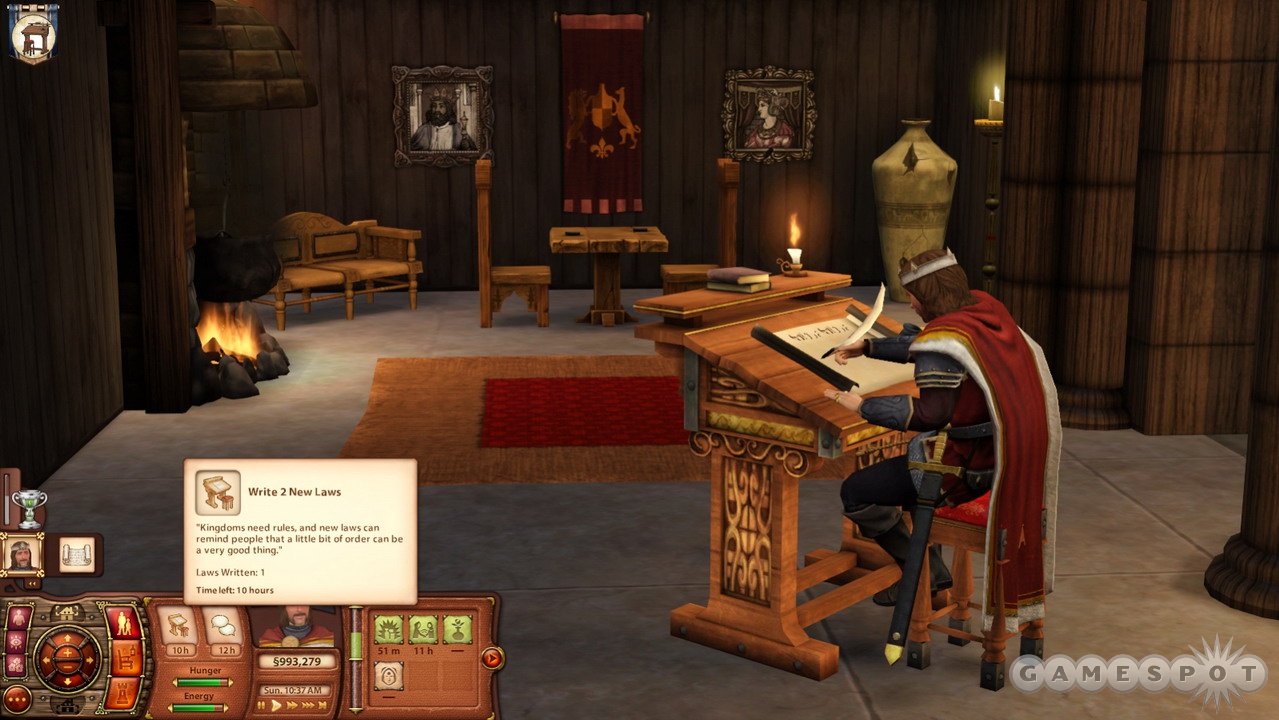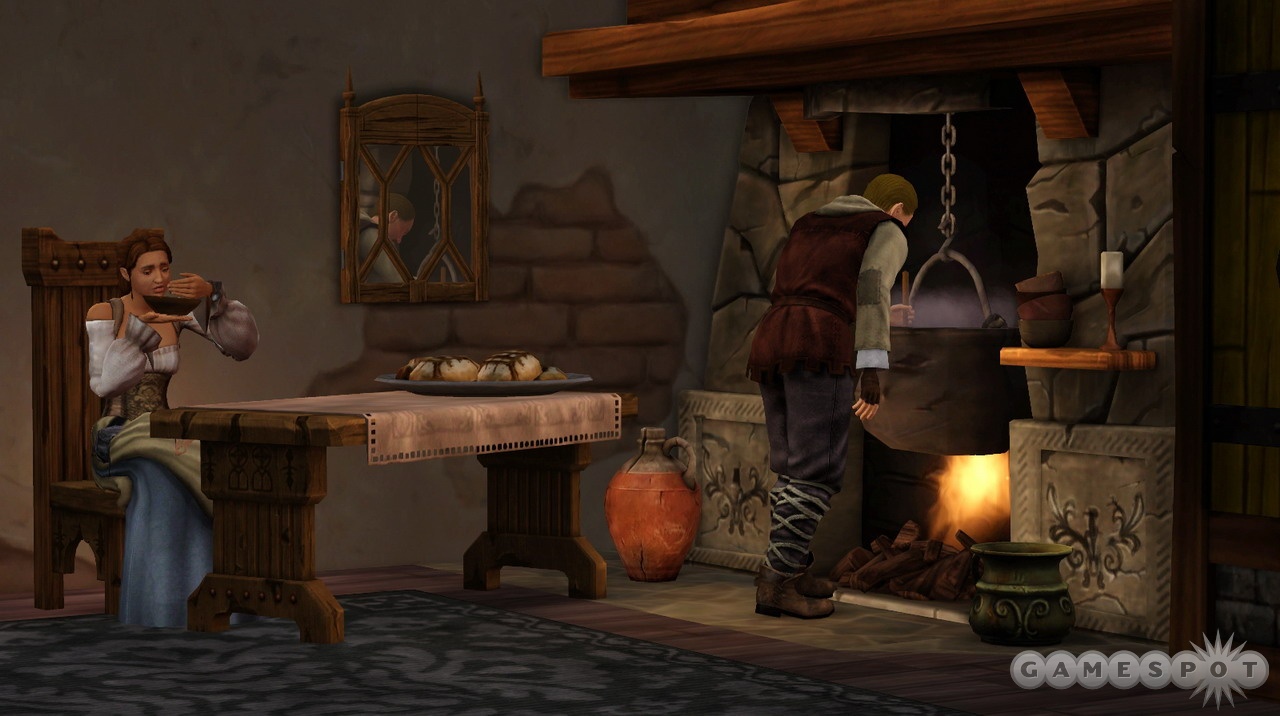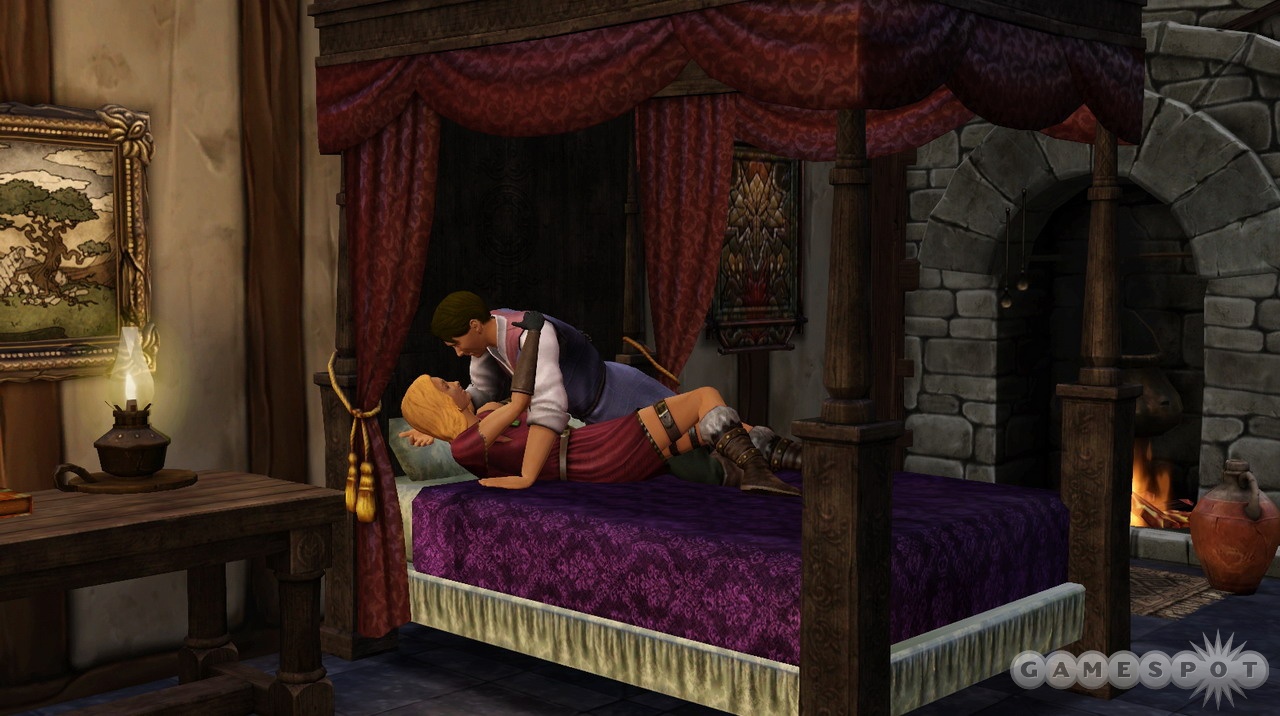The Sims Medieval Updated Q&A - Classic Sims Elements
Executive producer Rachel Bernstein explains how despite its many new features, The Sims Medieval will still have many classic elements that fans of The Sims enjoy.
By now, you may know that The Sims Medieval is the next game with "The Sims" in the title and also that Medieval will be a very, very different experience. Unlike all those other Sims games, Medieval will take place in the ancient days of knights and peasants and will focus much more strongly on role-playing elements…and will have a definite beginning, middle, and end, after which you're awarded points for how well you defended and advanced your kingdom. But the game will also have many of the classic elements that fans of The Sims enjoy. Executive producer Rachel Bernstein explains.
Another Crab's Treasure Is A Soulslike 3D Platformer | GameSpot Review Stellar Blade Review Nintendo 64 – April 2024 Game Updates – Nintendo Switch Online Super Monkey Ball Banana Rumble - Official Multiplayer Features Trailer PUBG | Erangel Classic Returns Gori: Cuddly Carnage | Meow Launch Date Announcement Trailer Genshin Impact - "Arlecchino: Afterglow of Calamity" | Collected Miscellany Marvel Rivals - Official Loki Character Reveal Trailer | The King of Yggsgard Fortnite Festival - Official Billie Eilish Cinematic Season 3 Trailer Remnant 2 - The Forgotten Kingdom | DLC Launch Trailer Stellar Blade - Official "The Journey: Part 2" Behind The Scenes Trailer | PS5 Games Dead by Daylight | Tome 19: Splendor | Reveal Trailer
Please enter your date of birth to view this video
By clicking 'enter', you agree to GameSpot's
Terms of Use and Privacy Policy
GameSpot: While we know The Sims Medieval is a very different step in a very different direction, we also understand that there will still be a lot of what fans of the series love. For starters, tell us about Create-a-Sim mode. We know that clothing options and color swatches are being modified to be more in keeping with the game's painterly, medieval-themed look and feel. Just how much freedom will players have to make the sims they want to make? What about players who want to make sims that resemble themselves or their friends in real life?
Rachel Bernstein: Players will really be able to get creative with the Create-a-Sim feature, and we've found that players can spend hours creating their hero characters. Players will be able to customize every detail of their sims' clothing, from the intricate design of every layer of fabric to the colors of their jewels. They'll be able to customize every hairstyle and facial feature on their heroes, and they can adjust aging features and body size and muscle. We've worked hard to support a wide variety of features, so yes, players will be able to make sims that also resemble their friends.
GS: On that note, let's also discuss build mode, which is being modified, at least for the royal castle, to keep room sizes preset and to keep the professional dwellings of various characters consistent with their daily duties (wizards will need to have some kind of spell workshop table, blacksmiths will need to have some kind of forge, and so on). Beyond that, how much freedom will players have to customize their castles and the rest of the town? Are non-castle lots going to be as open-ended as a community lot in The Sims 3? How much freedom do players have to customize the contents and functionality of their Medieval lots?
RB: We really wanted to focus on the customization of "furnish mode" (which was called "buy mode" in The Sims 3), letting the player focus on the finer details of the buildings--the tapestries, wallpaper, wood finishes, furniture, and other objects. Players will be able to customize the interiors of the rest of the kingdom however they see fit.
GS: The Sims 3 opened up character and lot customization with a color wheel and swatch tools that let players copy-paste alternate-colored patterns onto household items, cars, and clothes. How much of that color and pattern customization will make it intact in Medieval? Could you also discuss some of the other aesthetic customization features that will be unique to Medieval to help players make their castles seem like their homes, such as lighting tools and wallpaper/tapestries?
RB: You'll find much of the same Create-a-Sim customization in Medieval that you experienced in The Sims 3. While in furnish mode, you can alter the patterns and colors on most objects, including wall and floor patterns. In order to get more vibrant and realistic textures in Create-a-Sim, we've built some of the patterns into the clothing itself, though you can still change the colors to anything you desire on the color wheel. There are many objects of several different styles to choose from in furnish mode--from beautiful and grand tapestries and sculptures that look grand in a throne room or reception hall, to little trinkets that make your tiny hovel feel more like a home.
GS: In more-recent Sims games, it's clear that the team has wanted to include collectible items for pack-rat players who love collecting rare plants, rare fish, and rare cooking recipes. How much of this kind of collection gameplay will we see in Medieval? Where in Medieval can collectors get their fix? Is the achievement/medal system partially intended to scratch this itch, for instance?
RB: Yes, we have a robust achievement system where players will be able to complete hundreds of mini-goals. The game tracks the overall number of completed achievements, and as these are accomplished, an ornate jewel (representing the eye of the watcher) becomes visibly "slotted." Completionist-collector players will be well rewarded for their diligence and hard work. Roughly, these achievement goals can be divided into three categories: game, kingdom, and sim.

Game-related achievements include goals like "place 25 buildings," "discover all minable minerals," and "acquire 1 million simoles." Kingdom-related achievements track things like "have five gluttons and five drunkards in the kingdom at one time," "slay five whales in the kingdom," and "build security at the expense of knowledge." Sim-related achievements are concerned with goals like "win a kingball game with worst paddle versus best paddle," "be drunk for 24 hours," and "cheat at cards with a Pateran priest."
Additionally, we also have an "ambition" system that will require multiple game play-throughs to unlock all content. While achievements serve more as mini-goals within a game session, ambitions are chosen at the start of the game and represent the overall kingdom goal to which players aspire as they play. When players complete ambitions at different success levels, they will unlock new and varied ambitions that they can select for a new and different game experience.
GS: Some Sims players are ambitious, career-minded individuals who don't mind forcing their little computer people to spend night after lonely night "grinding" away at improving career skills like charisma, logic, body, and so on. How much "skill grinding" will be in Medieval...or will there be any? How does building up skill work with the game's quest-based structure? For instance, if a knight finds himself at odds with a quest that requires him to complete a task to defeat a mighty opponent in only a few in-game days, but he lacks the combat skill to win, what can he do about it?

RB: There is skill grinding in Medieval, and each hero has specific skills that are associated with his/her profession that they will need to strengthen. Strengthening skills will let heroes level up in their professional level and will give them more options or ways to complete the quests, such as combat at higher levels, casting more spells, or creating more potions.
When playing through a quest with two heroes, there will be times when there isn't a quest task for each hero. To make the most use out of your time, you can plant the sim who isn't working on a quest task at one of his or her signature objects, so that character can "grind" experience in the background and maybe gain a level or two.
For quests that require experienced knights skilled in combat, knights that are not high enough level will not be allowed to take on the quest.
GS: We've already discussed the ways that deviant Sims players will be able to kill off their little computer people in Medieval, but what about those players who like to create overarching stories for their households, playing as families that get married, have kids, age, and touch the lives of many other characters? How will Medieval let players tell that kind of overarching story?
RB: Players will still be able to tell stories in their Medieval world. They can have their sims court one another, get married, have a baby, watch the baby grow into a child, and interact with the child in a family environment. With the deeper focus on professions, traits, and fatal flaws, the bulk of a sim's time is spent in stories that revolve around their professions, developing their heroes, and participation in quests.
GS: Another of the most intriguing aspects of the Sims series as a whole is the way that sims, with their individual personality traits and general level of autonomy, can just be put in some situation (the more awkward, the better) and let loose for players to sit back and watch whatever unexpected pandemonium results. We understand that Medieval will let players choose traits for their characters (including some all-new traits exclusive to Medieval), but how will the game let players experience those weird, random moments where their autonomous characters do something unexpected, or interact in an unexpected way with characters that may or may not be personally compatible?
RB: We chose a huge variety of traits and flaws so that players could create sims who were truly unique. The traits themselves range from the obvious (such as adventurous, chivalrous, or scholarly) to the not so obvious ("a whale ate my parents"). With each trait come unique interests, actions, and needs that will make every sim feel more alive and have more of a distinct personality. Traits can have a big effect on how a sim will go about his job and complete quests. For example, a drunkard might not work at all and constantly be in search of alcohol. A workaholic might be great at getting things done, but will constantly be in poor health due to lack of sleep. Each trait and flaw will need to be dealt with differently, and you see very different results depending on which ones you've chosen. Players may find themselves in a situation where their sim who has the "alcoholic" fatal flaw will refuse to complete his or her task until having a drink, or their sim who has the "narcoleptic" fatal flaw constantly falls asleep on the quest.
GS: Some players play The Sims because they're serious about interpersonal relationships. They want to create a playboy character who has "woohoo" with every eligible woman in town, bachelorette or otherwise. Some players want to be friends with every other sim in town to throw the best parties and will juggle meetings, clubbing, phone chatting, dates, and parties to keep up their relations. How much relationship-juggling will there be in Medieval? How will relationship junkies spread their social butterfly wings in the game?

RB: There will still be relationship juggling in The Sims Medieval, just set in the Middle Ages. Instead of talking on the phone, sims will send messenger pigeons, and instead of going to the latest nightclub, they'll be hitting the tavern!
GS: Finally, is there anything else you'd like to add about how Medieval, despite its new direction, will still have much of what fans of The Sims enjoy?
RB: The judgment zone is a really funny way to play and torment your sims. Players will be able to put sims in stocks and throw eggs or tomatoes at them or throw them in the pit of judgment and see how the pit beast responds to your sims--he may eat you or fall in love with you!
GS: Interesting. Thanks, Rachel.
Got a news tip or want to contact us directly? Email news@gamespot.com
Join the conversation